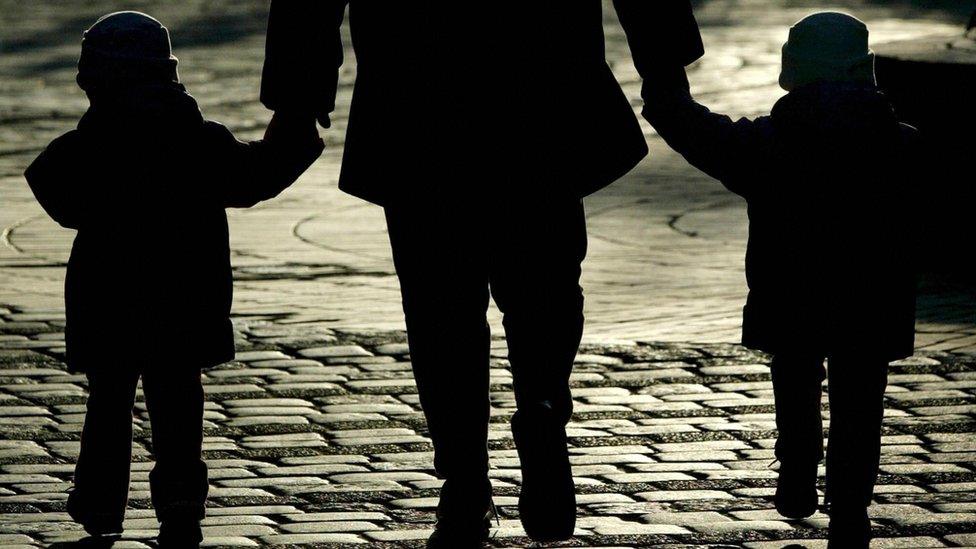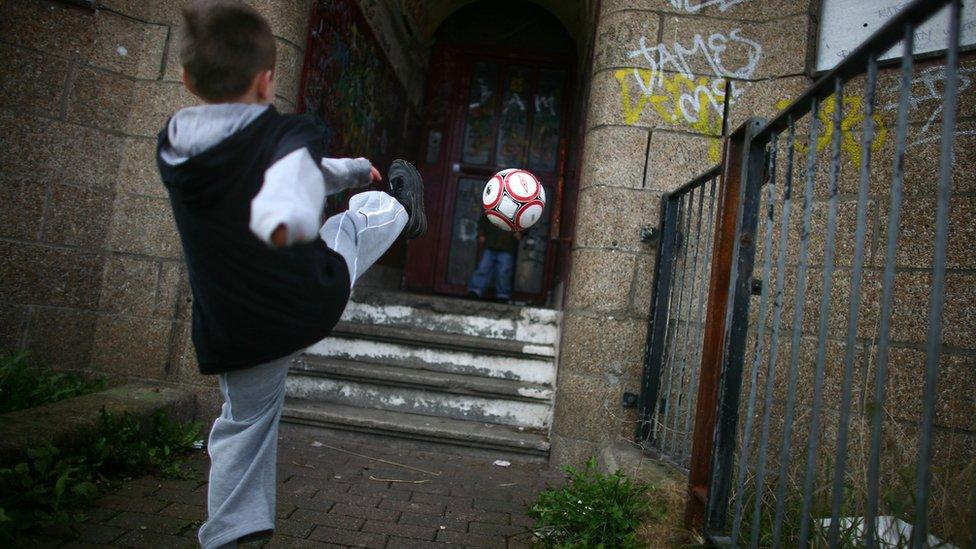New benefit cap starts amid fears for single parents
- Published
Single mother Emma: "If I lose the house - it is scary"
A single mother has told the BBC she fears losing her home, on the day the new benefits cap is introduced.
Emma Bradley, who has four children, including a baby, said she could be left £76 a week short on her rent unless she finds work.
The cap - which limits the income households receive in certain benefits - has been reduced from £26,000 a year to £20,000 a year outside London.
The government says the cap is "a clear incentive to move into a job".
But the policy has been criticised by campaigners and unions.
The GMB union described the lower cap as "a monstrous new assault on 40,000 single mothers, which risks shattering the life chances of children up and down our country".
Under the new system, Ms Bradley's benefits will be capped unless she works at least 16 hours a week.
Speaking to BBC Breakfast on the day the new system was introduced, the mother-of-four from Coventry said she would "quite happily work", but the childcare costs and the job of looking after her four children made it much harder to do so.
She said she was having sleepless nights worrying about how she would find a job to fit around her family, saying: "If I lose the house, which could happen, it is scary to think 'what would I do?'."
'Incentive' to find work
The earliest free childcare provision is offered is when a child is aged two.
The Gingerbread group, which campaigns for single parents, said 43,700 single parents with a child under the age of five would be hit by the cap.
"The new benefit cap is likely to drive more single parents into poverty. Many will have to choose between the roof over their children's heads and other essentials such as food and heating," said Gingerbread policy officer Laura Dewar.
But ministers say the level of the cap is fair because it is close to the average salary after tax. The Department for Work and Pensions described it as "a clear incentive to move into a job".
The current Work and Pensions Secretary, Damian Green, said it was wrong that some claimants could receive more in benefits than the average wage.
He said the government was making it "as easy as possible" for claimants to get work, by offering free childcare offers and structuring benefits to encourage people in to employment.
Speaking to BBC Radio 4's Today programme, he denied that children of single parents who do not work were being "condemned" by the changes.
"I'm not saying that lone parents have to go and find a full-time job. If they want to avoid the benefit cap they only have to be working 16 hours a week and we will be providing free childcare to enable them to do that," he said.

Some 320,000 children will be affected be the changes, analysis suggests
The cap - which, in total, is now set to affect an estimated 88,000 households primarily with high rents or large families - relates to a string of benefits, external for those aged 16 to 64 including child tax credit, housing benefit, jobseeker's allowance and income support, but excludes some others, external such as disability living allowance.
Households where someone works more than 16 hours a week are exempt.
Under the new cap, those living in the UK outside of Greater London will receive a maximum of:
£384.62 per week (£20,000 a year) for a couple
£384.62 per week (£20,000 a year) for single people whose children live with them
£257.69 per week (£13,400 a year) for single people who do not have children or whose children do not live with them
The limits are higher for those living in Greater London boroughs. The new cap is:
£442.31 per week (£23,000 a year) for a couple
£442.31 per week (£23,000 a year) for single people whose children live with them
£296.35 per week (£15,410 a year) for single people who do not have children or whose children do not live with them
Those affected will most likely see their housing benefit amount being cut, but the changes are expected to take a few weeks to be fully implemented.
Research by the Chartered Institute of Housing suggests 320,000 children will be affected (estimating 115,000 households are impacted) with families losing up to £100 a week.
The cap will save the Treasury an estimated £100m a year in the long run, according to the Institute for Fiscal Studies (IFS) - only a fraction of the total £12bn cuts to welfare spending over this parliament.
But the IFS questioned whether the policy would actually have the desired effect. The lower cap would fail to move the majority of those affected into work or prompt them to downsize their home, it said.
Speaking to the BBC shortly after resigning as work and pensions secretary in March, Iain Duncan Smith hit out at the "arbitrary" decision to lower the welfare cap. He questioned why working-age benefits were hit while pensioner benefits were protected.
'Route out of poverty'
A Department for Work and Pensions spokesman said: "We are committed to helping lone parents into a job which fits in around their caring responsibilities, which is why we are doubling the amount of free childcare available.
"We know that work is the best route out of poverty, and there are now record numbers of lone parents in work.
"The benefit cap provides a clear incentive to move into a job, even if it is part time, as anyone eligible for working tax credits is exempt.
"Even with the new cap, lone parents can still receive benefits up to the equivalent salary of £25,000, or £29,000 in London."
Some discretionary funds are available for people struggling to pay their rent.
- Published7 November 2016
